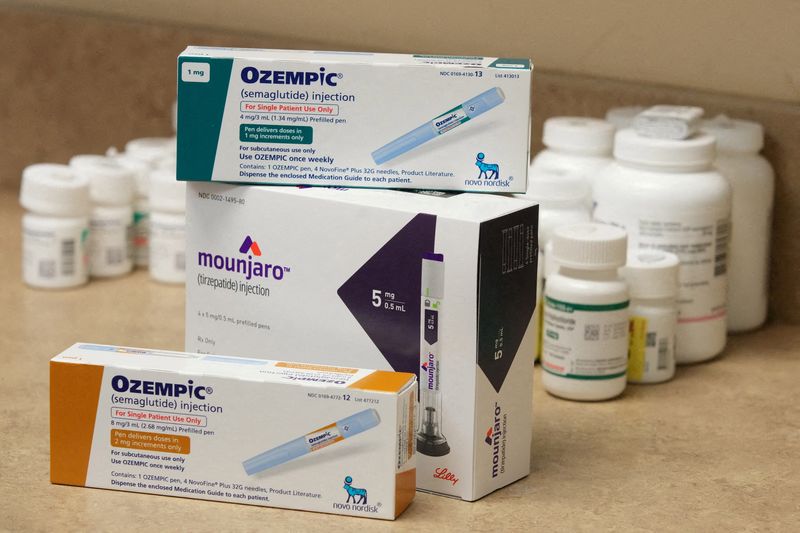By Bhanvi Satija and Savyata Mishra
(Reuters) - Weight loss was the talk of this earnings season, making names such as Wegovy, Ozempic and Mounjaro the water-cooler discussion that companies across the globe could not ignore.
Analysts attended earnings calls in the third quarter armed with questions for healthcare and consumer companies about the potential effect on their sales from the growing popularity of these drugs, known as GLP-1 agonists.
A Reuters analysis of earnings transcripts for the third quarter showed "GLP-1" or alternatives like "obesity" or "weight-loss medications" were mentioned 256 times across 29 U.S. and European healthcare and consumer companies.
That's more than double the mentions for the second quarter, when those phrases came up 127 times.
"It's definitely a hot topic," said Jeff Jonas, portfolio manager at Gabelli Funds. "They (companies) are all having to respond to this to whether it's a positive for their business or trying to argue why it's not a negative."
This class of medicines, which includes Eli Lilly (NYSE:LLY)'s Zepbound and Novo Nordisk (NYSE:NVO)'s Wegovy, have proved effective in treating diabetes and weight loss and may also help cut the risk of stroke or heart attack, making them potentially life-changing for people around the world.
Investor interest in the topic has been growing for some time, but took off on Oct. 4 when Walmart (NYSE:WMT), the largest U.S. retailer, noted that there had been a slight pullback in food demand from customers taking weight-loss treatments.
Walmart U.S. CEO John Furner, however, told analysts last week that it was too early to tell how the treatments will affect their customers and business.
Most other major consumer products makers such as Hershey and Mondelez (NASDAQ:MDLZ) fielded questions about the drug, with some analysts homing in specifically on sellers of sugary foods.
Truist Securities downgraded Krispy Kreme in late October, citing the overhang on such stocks due to the effect from weight-loss medicines.
Krispy Kreme shares are down 15% since August 1, a period that coincides with a 31% rally in Eli Lilly, though the doughnut chain's stock has still gained 20% in 2023.
While some consumer companies have talked about factors such as fewer calories being consumed, "these kind of large extrapolations" seem to be a bit of a stretch, said BMO Capital analyst Evan Seigerman.
GLP-1 WINNERS AND LOSERS
Novo Nordisk unseated LVMH as Europe's most valuable listed company in September, and the Danish drugmaker's shares have risen 48% this year.
Eli Lilly's stock has risen about 63% making it the world's most valuable healthcare company with a market cap of nearly $560 billion.
Drugmakers have faced various types of questions about these treatments. For big pharma manufacturers like Pfizer (NYSE:PFE) and Amgen (NASDAQ:AMGN), analyst questions were aimed at their obesity drug candidates. Health insurers including UnitedHealth (NYSE:UNH) and Cigna (NYSE:CI) focused on the pricing of these drugs.
Lilly has benefited from the use of Mounjaro, which was prescribed for diabetes. Its weight-loss counterpart, called Zepbound, was approved in the United States on Nov. 8.
On the other end of the spectrum, medical device makers and dialysis services providers which profit from treating obese patients have had to allay investor concerns about the impact of these highly effective drugs on their markets.
Investor worries have led to a selloff in medical device makers, sending iShares US Medical Devices exchange-traded fund down 7% this year. Fund managers might still be worried about investing in stocks perceived to be among the "GLP-1 losers," said HSBC analyst Rajesh Kumar.
The high prices of these drugs, potential lack of insurance coverage and uncertainty around long-term use are among common arguments used by companies to allay concerns.
Still, investors are only beginning to wrap their heads around the fact that these drugs could possibly be the most used ever in the pharmaceutical industry.
"I just think these are probably going to be the best-selling drug class of all time. But it is going to take a few years to develop," Jonas said.
